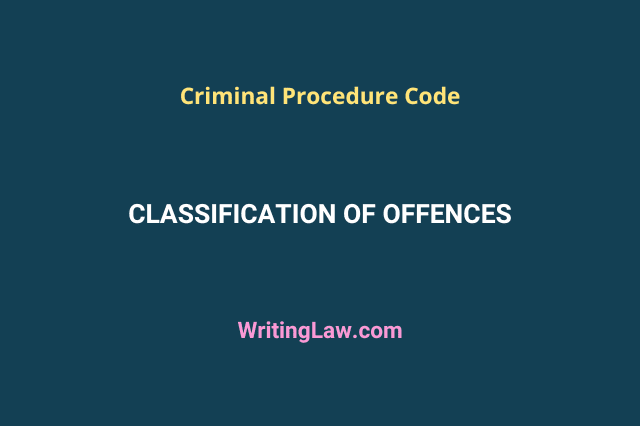
It is essential to categorise offences into different kinds to provide proportionate punishment to the convicted person. The Code of Criminal Procedure, 1973 provides various types of offences depending on the gravity of the act. In this CrPC law note, we will discuss the different classifications of offences.
Classification of Offences
According to the Code of Criminal Procedure, the offences can be classified into the following categories:
Let us discuss these categories of offences one by one.
Bailable and Non-Bailable Offences
Bailable Offence
- Section 2(a) of CrPC defines bailable offences.
- Bailable offence can be defined as an offence in which bail is a matter of right.
- According to section 2(a), a bailable offence is an offence which has been shown as bailable in the First Schedule of the Code of Criminal Procedure.
- These are the offences which are punishable with imprisonment below three years.
- They are non-grave and of less-serious nature.
- Examples: Bribery, cheating, forgery, death by rash or negligent act, public nuisance, etc.
Non-Bailable Offence
- According to section 2(a) of the Code of Criminal Procedure, non-bailable offences are the other offences which are shown as non-bailable in the First Schedule of CrPC.
- In non-bailable offences, bail is not a matter of right, but it is the court’s discretion. Only Judicial Magistrate can grant bail.
- These are the offences which are punishable with imprisonment above three years.
- They are graver and more heinous in nature.
- Examples: Murder, rape, theft, robbery, criminal breach of trust, causing miscarriage without a woman’s consent, etc.
Cognizable and Non-Cognizable Offences
Cognizable Offence
- Cognizable offences are of serious nature. The definition of cognizable offence is provided under section 2(c) of the Code of Criminal Procedure.
- Cognizable offences are offences in which a police officer can arrest a person without a warrant. Or these are the offences which have been shown as cognizable offences under the First Schedule of CrPC.
- These offences are punishable by three years imprisonment or more.
- Under such an offence, police are under a legal duty to investigate without permission from the Magistrate.
- Examples: Murder, rape, dowry death, waging war against the state.
Non-Cognizable Offence
- Non-cognizable offences are less serious in nature. The definition of non-cognizable offence is provided under section 2(l) of the Code of Criminal Procedure.
- Non-cognizable offences are offences in which a police officer cannot arrest a person without a warrant or offences which are shown as non-cognizable offences under the First Schedule of CrPC.
- These offences are punishable with imprisonment of less than three years or with a fine.
- Under non-cognizable offences, the police have neither the duty nor the power to investigate such offences without the permission of the Magistrate.
- Examples: Voluntarily causing hurt, cheating, mischief, forgery, etc.
Compoundable and Non-Compoundable Offences
Compoundable Offence
- Compoundable offences are those where the victim and accused resolve their dispute through a settlement or compromise.
- Under a compoundable offence, the victim or the complainant (who filed the case) may enter into a settlement for a compromise and can drop the charges made against the accused.
- Section 320 of CrPC deals with compoundable offences.
- For such compromises, sometimes even court permission is required. For example, if an offence of theft takes place, then both the parties, that is, the complainant and the accused, need to take prior permission to compromise. Whereas under section 138 of the Negotiable Instrument Act, no prior permission from the court is required.
- Therefore, it can be said that offences that are less serious in nature can be settled or compromised.
- Other offences where court permission is not required:
- Defamation
- Criminal Trespass
- Adultery
- Causing hurt
- Offences where court permission is required:
- Criminal breach of trust
- Voluntarily causing grievous hurt
- Dishonest misappropriation of property
- Assault on a woman with the intention to outrage her modesty
Non-Compoundable Offence
- Non-Compoundable offences are more serious in nature.
- These are those offences where the victim and the accused cannot resolve their dispute by a settlement or a compromise.
- Such an offence can only be quashed by an order of the court because the gravity or the heinousness of the offence is very high from compoundable offence, and the accused cannot be allowed to run away from punishment.
- Other offences which are not mentioned under section 320 of the Code of Criminal Procedure are classified as non-compoundable offences.
- Examples: Rape, murder.
Read Next: Powers of Indian Police to Investigate as Per CrPC
- What Is Anticipatory Breach of Contract Under Contract Act? - 13th July 2024
- Who May File Written Statement (With Its Time Limit and Rules) - 31st May 2024
- Who Is a Legal Representative? - 30th May 2024







